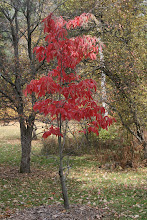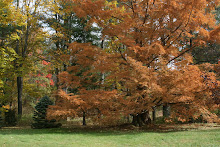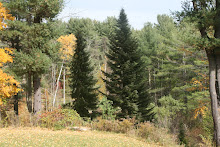 Green Leaf and Red Berry on a December Day at Pine Hollow
Green Leaf and Red Berry on a December Day at Pine HollowWelcome Winter! Tis the most wonderful time of the year! Seems strange though that we have not seen much snow whirling about but soon enough I’m sure. I love winter at the arboretum. Something about the way the bare branched trees create a level of transparency throughout the woods. It makes the pines and the ponds seem to standout even more. The birds are especially noticeable and fun to watch; the way they dart about yet seem to hang around curious about these strange two legged creatures in their space.
 One of my favorite winter berry trees at the arboretum is the American Holly Tree or Ilex opaca. There is a big male one that can be found at the beginning of the Fir Trail and then a couple female ones with red berries in the vicinity. As you probably know, the holly tree is a popular ornamental tree during the winter holiday season because of its attractive red fruit and dark green leaves. It can grow to be 15 to 30 feet tall. It has a smooth gray-brown bark and a dense crown. The evergreen leaves are lined with sharp spiny edges. The tree produces a greenish-white flower
One of my favorite winter berry trees at the arboretum is the American Holly Tree or Ilex opaca. There is a big male one that can be found at the beginning of the Fir Trail and then a couple female ones with red berries in the vicinity. As you probably know, the holly tree is a popular ornamental tree during the winter holiday season because of its attractive red fruit and dark green leaves. It can grow to be 15 to 30 feet tall. It has a smooth gray-brown bark and a dense crown. The evergreen leaves are lined with sharp spiny edges. The tree produces a greenish-white flower
 Light green trees in background of photo are American Holly
Light green trees in background of photo are American Hollyfrom April thru June which is replaced by red berry-like clusters in the fall. The tree is native to the eastern and gulf regions of the U.S. The holly tree prefers moist soils such as on the borders of swamps but on the other hand thrives on drier soils in protected areas such as along the coast behind sand dunes. It is slow growing and is not reliably cold hardy throughout New York State which makes the arboretum’s specimen so special. The evergreen leaves and berries provide shelter and nourishment to birds of all kinds.
One additional piece of information that I found while doing research on this tree was that the Holly tree has a significant place in history. A study of all colonial gardens of Virginia shows that Holly trees were a favorite of them. Also, there are a number of entries in George Washington’s diary referencing Christmas Holly. In one instance he recorded that he transplanted many little Hollies from the woods but then confessed that his transplanting experiment failed and they died. He apparently tried again because today thirteen of the Hollies that Washington planted still stand. Amazing!
Enjoy the cold winter season!

Post Written by Sue Abbuhl
Photos December 2011 at Pine Hollow by Alan Casline











